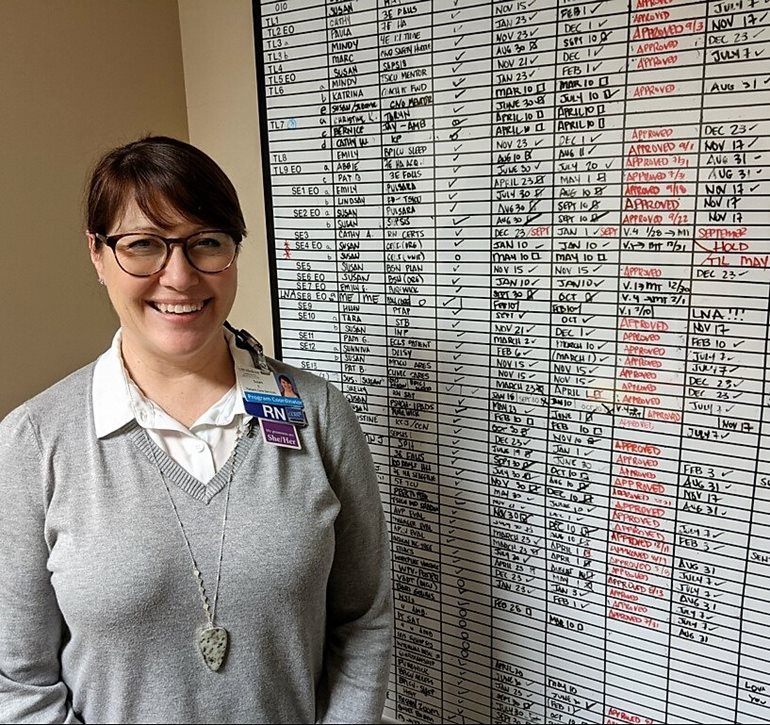When she worked as a firefighter paramedic, Susan Collins spoke as a firefighter. If others made a mistake, they’d hear matter-of-factly, “That was a terrible choice. Don’t ever do that again.” When Collins became a nurse with growing responsibilities, she had to think more about how she would speak.
”It was a steep learning curve to learn that nurses didn’t want to be talked to like that. You can’t call someone out in that way and expect to have a good relationship,” said Collins, who made a study of relationship-building communications in the Administrative Leadership track of her Master of Nursing program in the School of Nursing & Health Studies.
“How we can communicate as nurses to nurses really matters, and it can affect patient care,” said Collins, who said she still has the instinct to speak bluntly — but “it’s my inner voice now.”
In graduate school at UW Bothell, she learned not just nursing skills but also business skills, such as how to plan crucial conversations to be most effective. “I want to make sure we both get something out of the discussion.”
Beyond trauma ready

Courtesy photo.
Collins worked nearly 10 years as a firefighter paramedic before deciding to focus more on caring for patients. She received her Bachelor of Science in Nursing in 2008 from the University of Washington. Then, because of her experience in handling accidents and other emergencies, she was hired directly into the trauma intensive care unit at Harborview Medical Center, the top (Level 1) trauma center for Washington, Alaska, Montana and Idaho.
She loved providing critical care. With time, however, she also took on responsibilities as the charge nurse for a shift and as a preceptor, training new nurses. And, “always one to have something to say” in committee meetings, Collins grew to want a bigger voice for nurses.
“I felt that the policies and procedures and structures at the hospital didn’t have enough nurses at the table, making these decisions,” said Collins. She wanted to be in a position to make a change “so when decisions are made about patient care, it’s not a top-down decision, it’s bottom up.”
To move into such a position, Collins enrolled in the MN program and opted to take the Administrative Leadership track. Even before she received her graduate degree in 2019, she was hired as Harborview’s first Magnet coordinator. For the past two years she has been compiling data, assembling statements and surveys, and completing requirements for Magnet designation from the American Nurses Credentialing Center. It’s a distinction earned by only 8% of hospitals and health care organizations internationally.
Now, with the right procedures and personnel in place, Harborview will apply in August for the excellence designation. Anticipating success, Collins will work to keep Harborview in that select group, meeting benchmarks for redesignation in four years.
Among other things, she said, that involves monitoring “nursing-sensitive indicators” such as patient falls or hospital-acquired infections. A hospital that controls such incidents improves patient safety and care. It also helps nurse retention, because that’s a place where nurses want to stay — a “magnet.”
Making the jump
Collins moved into the job of Harborview’s Magnet coordinator from a bedside nursing position — and she says she could not have made the jump without the preparation she received at UW Bothell.
“The master’s on a leadership level assisted me with project management, organizing my time, organizing my communications,“ she said. “Not having business literacy prior to the master’s program, it would have been very hard for me to navigate an Excel spreadsheet or to really look at the analysis of the data.
“I wouldn’t have been able to galvanize that group or communicate succinctly the research that we’re doing,” said Collins.
One of her most influential instructors — the one who started her thinking about communication as relationship-building — was Barbara Hyland-Hill, affiliate faculty and former vice president/chief nursing officer at Providence Regional Medical Center Everett. “She broke down really complex topics into manageable pieces,” said Collins, adding that she remains in contact with Hyland-Hill when she needs advice.
Collins wants to follow that example of mentorship and plans to serve on a UW Bothell panel to answer questions from incoming MN students. She’s also evangelical with co-workers who don’t have a master’s yet, let alone one that includes business education in the curriculum.
“I’m really proud of the education I received at UW Bothell.”



